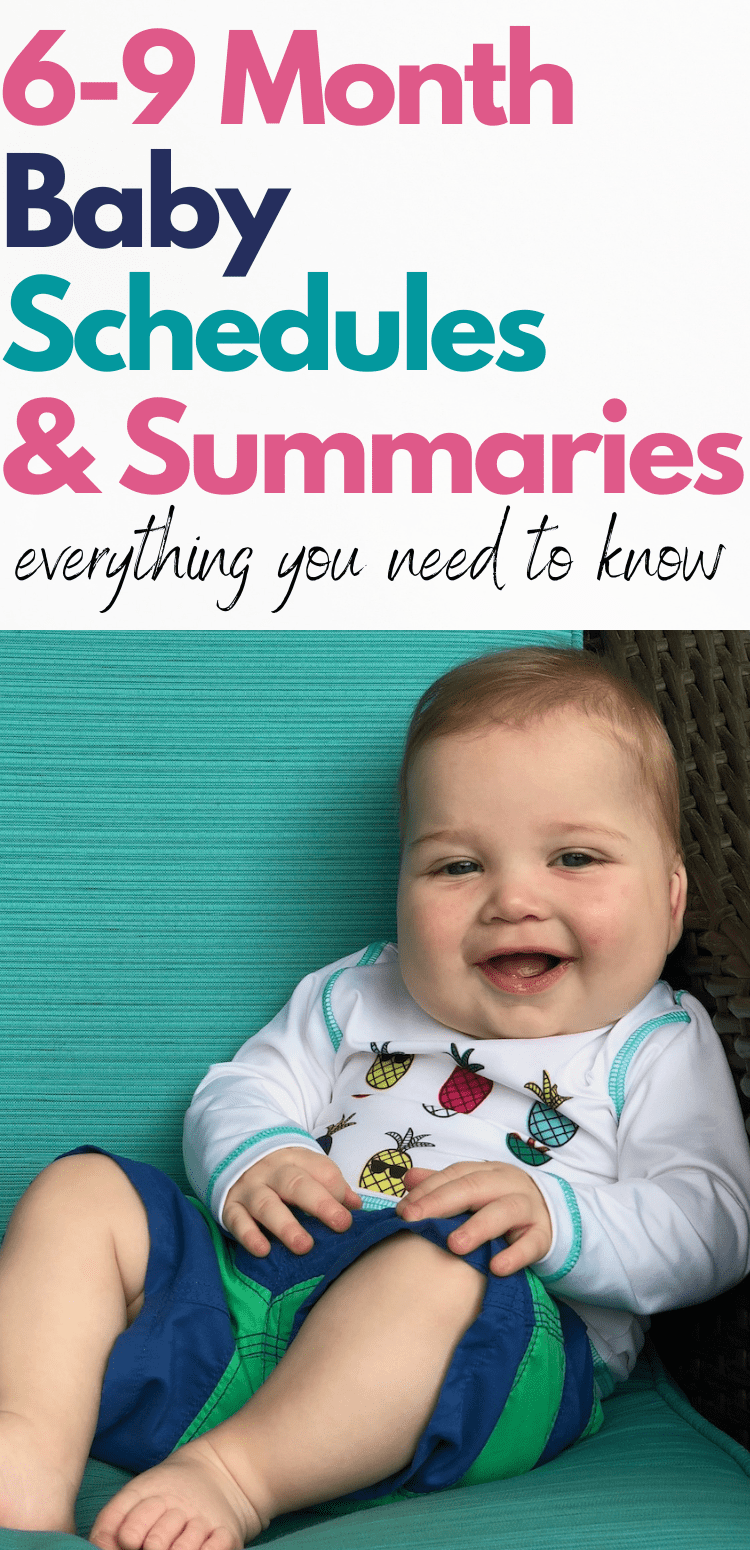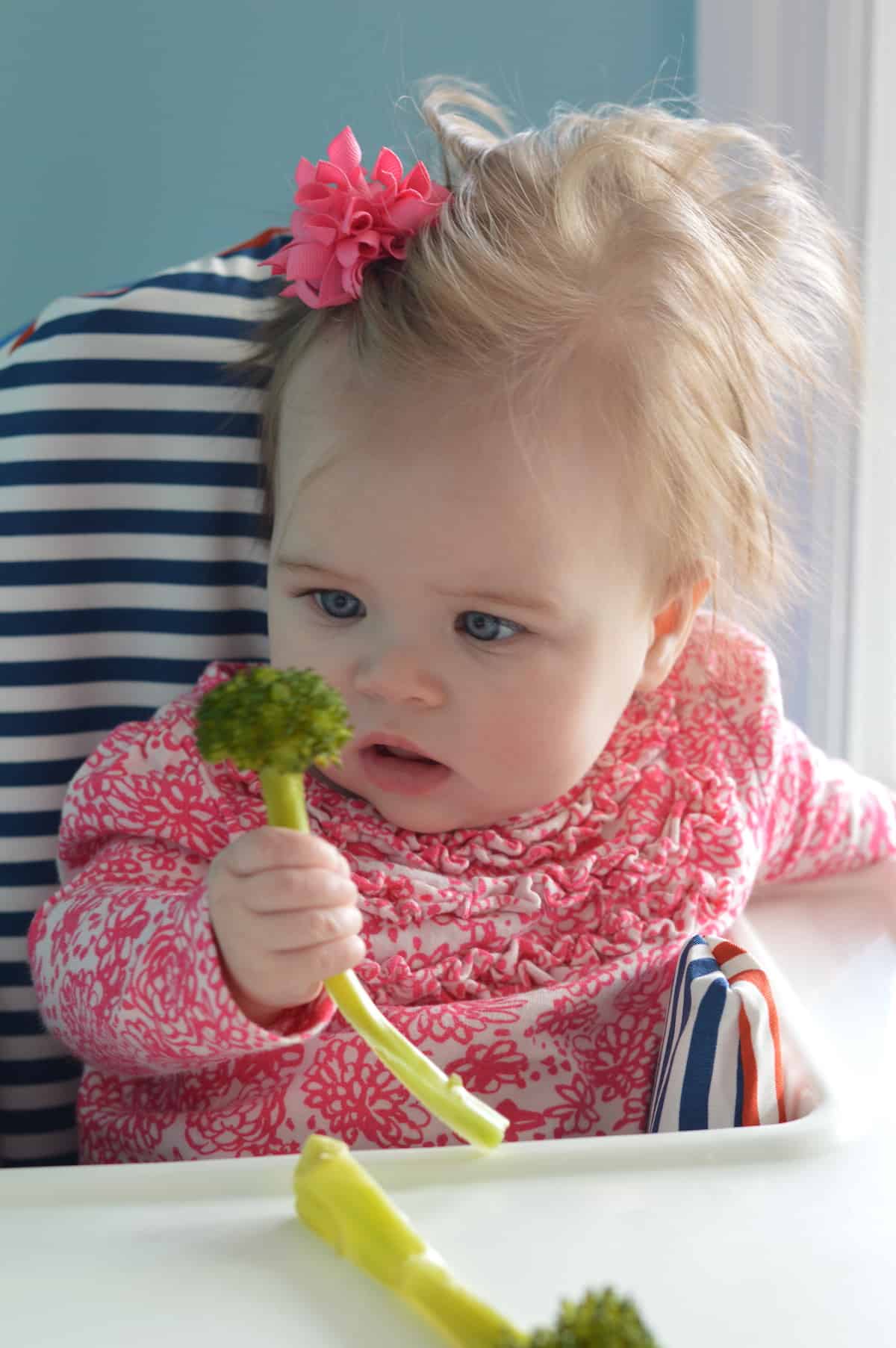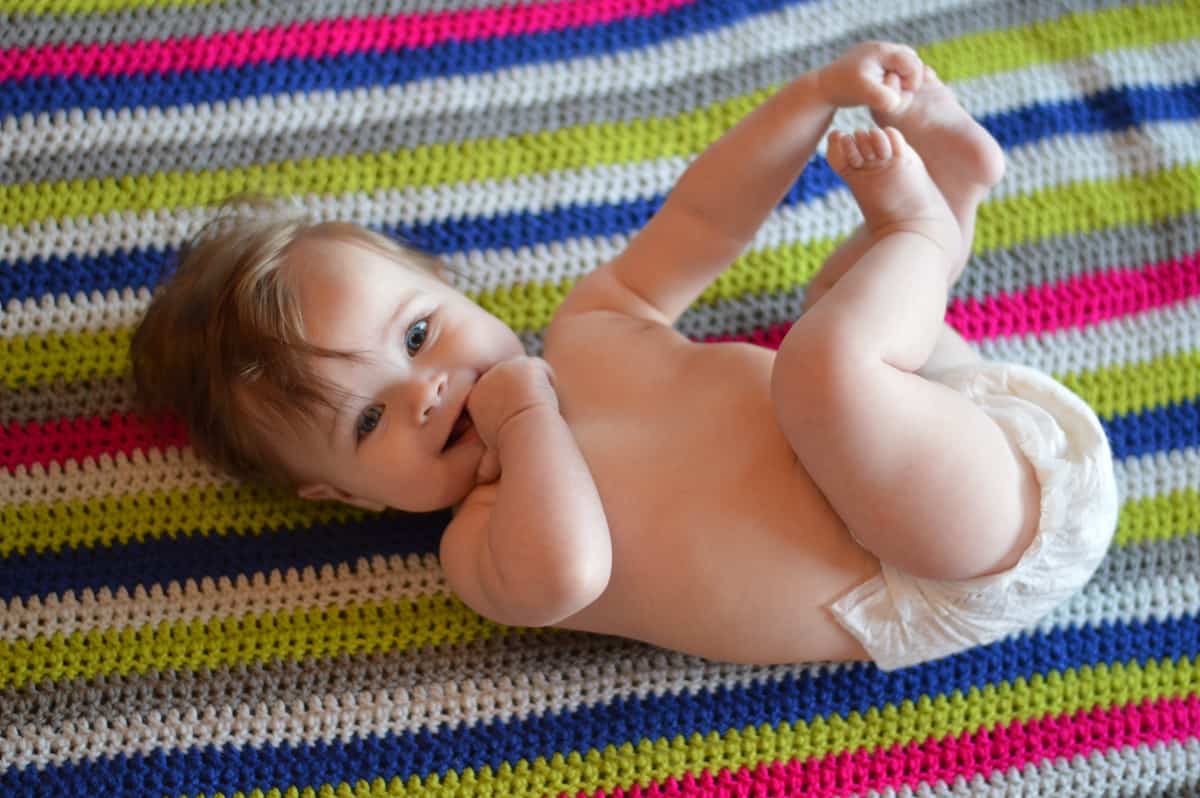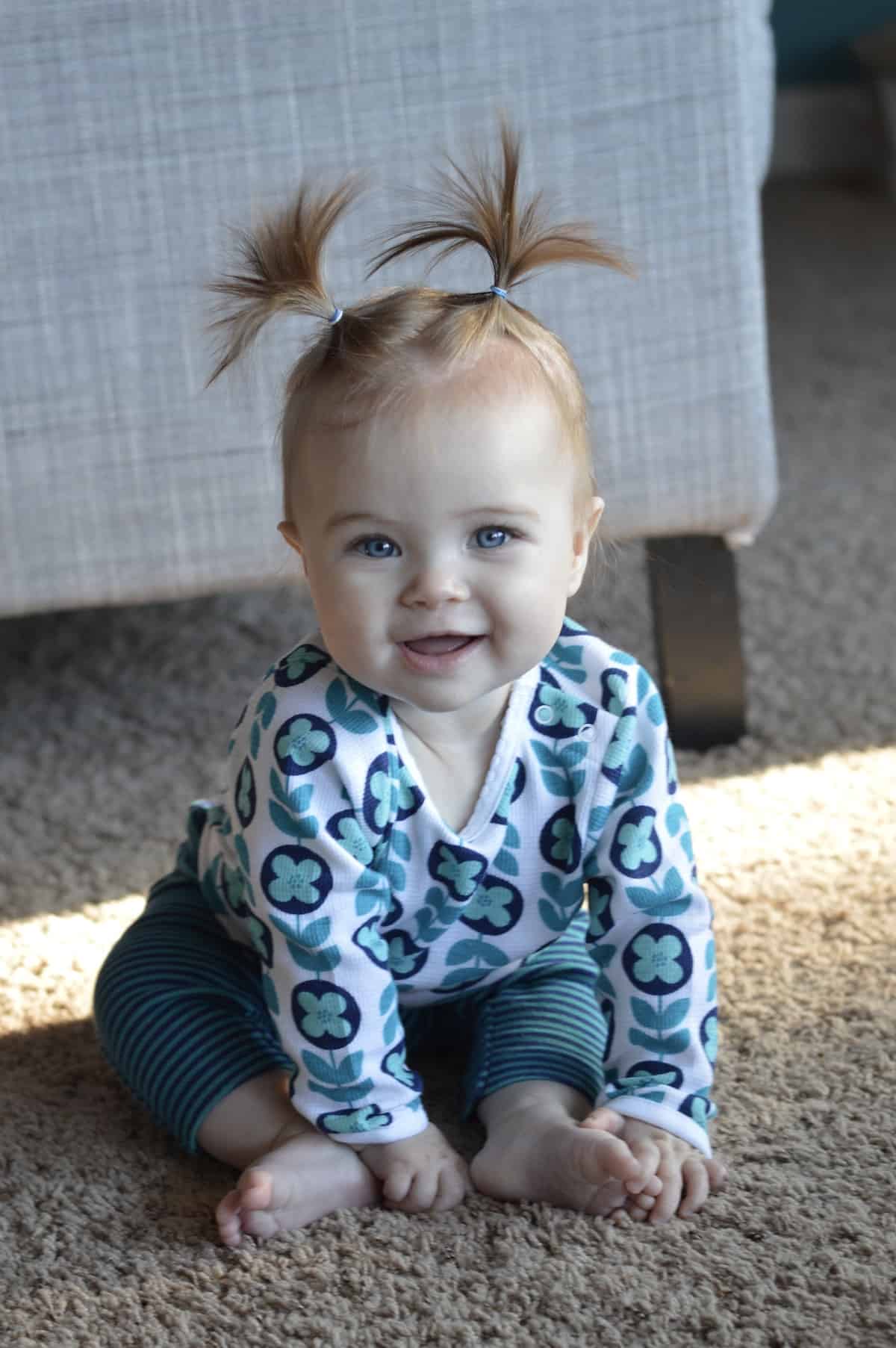Moms know that time really does fly the older baby gets. The half-year mark is a really fun developmental stage with many major milestones, including sitting up, crawling, scooting, and so much more! Having summaries and sleep schedules from 6 months to 9 months at your disposal can really help keep those transitions smooth.
After all, this is also the time that you’re probably going to start introducing solid food to your baby, which is a big step! Six months is recommended, but every baby is a little different so you might have already or you might wait a little longer.
At least you can look forward to a simplified schedule: no more night feeds (aka middle of the night feedings), no more third nap (for most babies, daytime naps drop to 2 by six months old), and an average of eleven hours of sleep. Keeping the baby on a schedule will help encourage healthy circadian rhythms and keep those sleep patterns consistent!
Baby’s fine motor skills, social skills, and personality also continue to develop as they learn more and more about the world around them and develop new skills. Expect a continued growth spurt throughout the next few months!
Baby will also keep on practicing those language skills! They will babble and baby-talk a lot as they unwrap the mysteries of speech, but it’s very possible that you might hear some actual words by the end of this stage. Most babies will say their first words by their first birthday, so 6-9 months would be early, but not unheard of!
These baby summaries will cover what you can expect during this stage, including sample summaries and example sleep schedules for 6 months up to 9 months! I’m hoping my experiences with my four babies can help encourage other mamas, help navigate any sleep problems, and help establish your six to eight month old sleep schedule – no pediatric sleep consultant necessary 😉
Disclaimer: post contains affiliate links.

Six Month Old Summary
Halfway through the first year already? How did this happen, right? Baby is becoming more aware of the world around them and from here on out, they will spend a lot of time putting things in their mouths, dropping toys, and banging things around. This is how they learn about their surroundings!
It is also best to wait to introduce solids until six months old. Once we introduce solids I like to use the Baby-Led Weaning Method.
There are many benefits to baby-led weaning and I have many tips and tricks to help get you started, including the best supplies for baby-led weaning and a guide for the 30 first solid foods you should introduce to your baby!
Most six month olds are also ready to be introduced to the sippy cup at this time!
They also tend to handle longer stretches of awake time, which means more time for independent play and sibling bonding! If you’re wondering if baby is getting too much sleep (or not enough sleep), you may want to read up on high versus low sleep needs babies.
Learning your baby’s sleep cues will help prevent overtiredness (babies are easily overstimulated during awake times) which can lead to disruptions in their sleep stages. I don’t know about you, but I’m all for baby’s sleep cycle! A well-rested baby is a happy baby (and a happy mom!)
And now that you’re, hopefully, well past the 4 month sleep regression you def don’t want to deal with any more sleep problems for as long as possible 😉
Many babies will also be able to sit up by themselves at six to six and a half months, but it varies from child to child, so if your baby isn’t quite ready to support themselves yet, don’t worry! That’s totally normal! Either way, it’s a good idea to prop them up with some pillows to make sure they don’t fall over.

A Note on Breastfeeding and Solids Schedule for 6 Months Old
Babies truly only need liquid diets for the first year so breast milk or formula is the only MUST HAVE and liquid feedings should always come first when deciding your six month old baby’s schedule. When adding solids into the routine the breastfeeding and solids schedule for 6 months old can feel a little overwhelming to establish.
With my first baby I WAY overthought the whole thing. As I had more kids, and got a better understanding of Baby Led Weaning and how solid food is truly FOR FUN for the first year, it got easier to schedule. Breast milk and formula-fed infants should always have the focus on the feeding portion of their schedule be on that liquid diet, for the entire first year of life.
That’s it. That’s the most important thing. For the first 12 months of life, your baby’s main source of nutrients comes from the daily routine of liquids and making sure they get their full amount of ounces of formula or full feedings of breast milk is much more important than ANY solid meals.
My mantra from 6-12 months old is “Solids are FOR FUN for the first year!” When I started to feel stressed out about baby solids, and started worrying about new foods or making sure my baby ate “solid meals” I reminded myself of my hard and fast rule – keep food fun for the first year of life!
As you will see reflected in my sample schedule the six month old feeding schedule is more of a general guidelines kinda thing and not something I revolved their day around. I offered solids at a variety of times and usually not three times a day and sometimes not even at the same time of day. Sticking to the sleep schedule is still the top priority and introducing solid food is not as crucial so I don’t do much to change their routine in order to accommodate the baby’s diet beyond their feeding time for infant formula or breast milk which remains their primary source of nutrition.

It’s also important to note that healthy babies do not need any other liquid in their diet. At this age I will begin to introduce a variety of foods, easy to hold finger foods, and small amounts of different foods. Some parents opt for infant rice cereal and pureed foods which is fine as well – it’s all personal preference. You may choose to make your own baby food, feed your baby table foods that the family is eating, or even wait a bit longer until you introduce any solid foods for the first time. Let your baby led the way and try not to overly stress about this transition! Keep it light, keep it simple, keep it FUN!
At this age, I will also start to introduce a little water in a sippy cup and will offer it on the baby’s high chair at the same time of day as I offer the little bit of new tastes for them in the form of a small amount of solid food. I do not yet introduce any other form of liquid into their diet. Babies do not need, nor benefit from, fruit juices and are also too young for cow’s milk to be introduced.
If there is a decline in how much milk breastfed babies or formula-fed babies drink once they begin eating solids, it’s important to consider cutting back on the number of solid foods as, again, that liquid diet is THE most important!
Some babies go through growth spurts around this age and will chow down on sweet potato or cottage cheese or other items offered on their high chair during meal times, while others will hit a growth spurt and want to stay on the breast longer or still show hunger cues after finishing a bottle. A the 6-month mark if your baby is enjoying solids then that’s fine to up the amounts or nutritious foods offered, but be sure to offer the liquid feeding FIRST and up the amount of formula and/or length of time on the breast to ensure they receive the valuable nutrients their growing bodies need to be healthy!

Sample Sleep Schedules: 6 Months Old
By six months old, your baby is likely on the 4-hour schedule, which makes so many things so much easier! They are also most likely on the 2-nap schedule, which is an added bonus!
I’m still following the guidelines of the Babywise method, which I used with all 4 of my kids with great success! You may have heard of other sleep training methods such as Moms on Call (which is very similar), so it’s really just a matter of finding what works for you and your family.
This is the morning to bedtime routine my second-born, Britt, was one by the time she was 6 months of age, including her sample feeding schedule. I like sharing the schedules of my little one that also show my toddler’s schedule at that age. Remember the rule of thumb: put baby’s sleep needs first the first year but toddler sleep is still important to keep in mind!
- 6:45-7:15: Wake up, change diaper, nurse (no solids yet…still just nursing her!)
- After nursing: Independent Playtime
- 8:35ish: Bible Storytime
- 8:45-9:00: Down for nap (Kye has room time during her nap schedule)
- 10:45-11:15: Up from nap, change diaper, nurse (Kye usually watches movie while I nurse her for this feeding)
- After nursing: Independent Playtime
- 12:45-12:55: Down for nap
- 2:45-3:15: Up from nap, diaper change, nurse
- After nursing: Independent Playtime
- 4:45: Nap time
- 7:00: Nurse
- 7:20: Family story time, family prayers
- 7:35: Brittlynn down for the night
- 7:45 Kye down for the night

Sleep Schedules for 6 Months: Another Example
This was the routine for my third-born, Tess, so it’s a little different since I had two kiddos in school by that point. If that sounds like your life, this may be a better example of a baby sleep schedule! You can see with this schedule that I started introducing solids a little sooner with Tess but even with starting solids her baby feeding schedule was still very focused on her liquid diet:
- 7:00 Up for day. Nurse. Feed solids (unless I take kids to school then she skips solids)
- If not taking kids to school then she has 25 min of independent play time activity in pack and play after solids
- 8:45-9:00: Down for nap
- 10:45-11:15: Up from nap. Nurse. Pick up kids from school
- 12:30: Solids when we get home from school (it’s not ideal but it works!)
- 1:00: Down for nap
- 2:45-3:45: Up from nap (since I dropped the cat nap I let her sleep late for this nap if she wants). Nurse.
- 25 min of independent playtime in pack and play
- 5:30-6:00: Solids while family eats dinner
- 6:30: Bath
- 6:45: Nurse then straight to bed (I did bath early and fed earlier if needed for the days she took to adjust to dropping cat nap)

6 Month Old Sample Summaries
Here are the six month old schedules for each of my four kids! As any mother with multiple kids knows, each baby is so uniquely different! But of course, there will be some overarching similarities. These are meant to give you a clear picture of what to generally expect at 6 months! All of these posts touch on my decision to start solid foods and when and how introducing solids impacted the baby feeding schedules.
Big Milestones During Month 6
- Baby will possibly be able to sit up by themselves
- Can bear weight in their legs when held upright
- Possibly time to introduce them to solid foods and sippy cup!
- Use their hands more: drops things, grabs things to put in mouth, even clapping or imitating your hand movements!

Seven Month Old Summary
Most 7-month-old babies can sit up unsupported by now, and it’s very likely that your seven month old is crawling or on their way to crawling as well! They may also be rolling across the floor, creeping (propelling themselves forward using their tummy), or pushing themselves up on their hands and knees. Anything to get mobile as their muscles continue to develop!
This is also about the time that the “pincer grasp” starts to develop–the ability to hold objects between their thumb and forefinger. You can feed them cheerios or other small foods to help them develop this skill, but just be careful of any small toys that could pose choking hazards!
It’s also possible, depending on the baby, for them to get their first tooth by now, but this can also happen later on down the road. Like I said above, many of milestones from here on out are really dependent on the individual baby!

Sample Sleep Schedules: 7 Months Old
This is an example of an eat-wake-sleep schedule you might implement with a 7-month-old. The sleep routine and wake times are pretty similar to that of a 6 month old, but in my case, this was the schedule I used for my third child, Tess. So I already had my hands full with two kids by then, but this could be easily adapted depending on your situation!
- 7:00 up for the day. Nurse and then do solids.
- 25 min independent playtime, if not taking kids to school
- 9:00 down for nap
- 10:45-11:15 up from nap, nurse
- 12:30 solids with kids after school for lunch
- 1:00 last nap
- 2:45-3:15 up from nap and nurse. Sometimes she will still sleep a little later, but usually she’s awake right at 3.
- 25 min of independent playtime
- 5:30-6:00 solids during family dinner
- 6:30 (or a little earlier) bath
- 6:45 nurse then straight to bed

7 Month Old Sample Summaries
Here are the sample schedules and summaries for each of my four kids during month seven! For a couple of my babies, we were just starting solid foods as we delayed introducing solid foods until 7 months old. For all of them, bottle feeding or/and breastfeeding continued to be the top priority which is also the recommendation via the American Academy of Pediatrics too!
Big Milestones During Month 7
- Sit up unsupported
- Creeping, rolling, and/or crawling
- First tooth, possibly
- Pincer grasp
- Continues to enjoy social interaction and responds well to games like peek-a-boo

Eight Month Old Summary
At eight months old, baby’s personality really starts to emerge, as do their likes and dislikes. They’re continuing to mature and learn more about the world around them, playing with toys, babbling and baby-talking.
This may even be the time when they start saying their first words, or at the very least, stringing syllables together into almost-words! If “mama” and “dada” haven’t happened yet, they’re coming soon! Do not be alarmed if baby is not yet talking or babbling, many babies (especially those with older siblings) develop at their own pace. Speech delay will reveal itself with time, usually by age two. So don’t stress over this! Your baby hearing you talk is the best way to encourage language development.
Once again, if baby hasn’t started crawling by now, this may be the month! In any case, she’ll be looking to get mobile and maybe even pull herself up into a standing position!
It is very normal for babies who are going through growth spurts or developmental leaps to struggle falling asleep or wake up earlier (especially during daytime sleep) because they want to practice their new skills. I’d often find my babies up on all fours swaying in their crib as they tried to figure the whole crawling thing out. Often the crib is the first place baby begins standing and you will lay them down for bedtime only to find them on the monitor standing up smiling at you 😉 Do not overly stress about this!
I remind myself when it comes to babies sleep “you can lead a horse to water but you can’t make him drink.” As long as baby is happy and content, stick to your schedule and routine and don’t let their crib playtime cause you to lose any sleep yourself! You set up the best sleep environment possible, but you can’t force your baby to actually sleep!
Other totally normal social developments include shyness toward strangers, clinginess toward Mom and Dad or separation anxiety, and attachment to a comfort object like a blankie. Their understanding of the world around them is expanding as they become more aware of themselves, you, and others!

Sample Sleep Schedule: 8 Months Old
Here is a sample schedule for an 8 month old baby sleep schedule in a 24-hour period. Once again, I already had two kiddos at the time, but as you can see, the older baby gets, the more simplified the schedule becomes! A huge relief for Mom!
At this age, you will most likely start to hear people comment on how great of a sleeper your baby is, if you haven’t already! Your hard work in establishing consistent night sleep and daily routine early on is now providing you and your baby with a solid, easy to follow 8 month schedule with a great two hour nap in the morning and in the afternoon! Who says you can’t get things done with a baby at home? 😉
- 7:00 up for the day. Nurse and then do solids.
- 25 min independent playtime, if not taking kids to school
- 9:00 down for morning nap
- 10:45-11:15 up from nap, nurse
- 12:30 solids with kids after school for lunch
- 1:00 afternoon nap
- 2:45-3:00 up from nap and nurse
- 25 min of independent playtime
- 5:30-6:00 solids during family dinner
- 6:30 (or a little earlier) bath
- 6:45 nurse then straight to bed for nighttime sleep

8 Month Old Sample Summaries
For reference, you can take a look at four different summaries of four very different 8 month olds! Even though they’re all my kids, they were all so unique and individual and your baby will be the same way.
Each of may babies had the same amount of naps and liquid feeds per day at this age but varied in the number of times per day they ate solids. They are all much older now (the youngest is four) and I can tell you with confidence that the variety of ways we introduced solid foods with them had no long term impact. Another reminder to keep it SIMPLE and keep solid food FUN for the first year 🙂
Big Developmental Milestones During Month 8
- First words might happen at this time!
- Baby might start crawling if they haven’t already
- Pulling themselves up into a standing position using furniture or walls
- Understand or recognize basic words
- Forming memories of how things like toys function

Other Posts To Check Out
- Newborn Summary and Sleep Schedules: 0-3 Months
- Infant Summary and Sleep Schedules: 3-6 Months
- Babywise Sleep Schedules Newborn to 6 Months
- Babywise 12 Month Sleep Schedules
- 30 First Foods With Baby-Led Weaning
- The Best Baby-Led Weaning Supplies
- A Letter to my Son on His 16th Birthday From Mom (Kye’s Bday Letter) - March 20, 2025
- Open Letter to my Daughter on her 12th Birthday – Love, Mom {Britt’s 12th Bday Letter} - January 16, 2025
- Letter to My Son on his 6th Birthday – Love Mom - January 8, 2025






